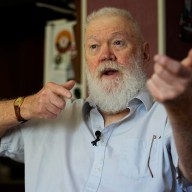According to the Cystic Fibrosis Foundation of Canada, cystic fibrosis (CF) is a very complex disease and is the most common, fatal genetic disease affecting Canadian children and young adults. There is no cure for it. A thick build-up of mucus affects the lungs and digestive systems of our children and makes it difficult for them to breath and digest food.
Dr. Hyun Joo Park is here, in Canada, to change all of that.
She obtained a Ph.D. in 1996 from the University of Southern California and has been a post-doctoral fellow at the research institute at the Hospital for Sick Children and is currently “working on novel approaches to the rescue of mutated CFTR, the primary defect in cystic fibrosis”.
Her husband, Dr. Hong-Yeop Song is no slouch either. He also holds a Ph.D. from USC and spent a year as a research professor at the University of Waterloo’s Department of Electrical and Computer Engineering and is currently a professor at the Yonsei University in Seoul.
In April 2008, Dr. Park applied for permanent residence in Canada for herself, her husband, and their 18 and 12-year-old daughters.
In August 2009 that application was refused by the Canadian consulate in New York on the grounds that she is inadmissible to Canada because her husband is inadmissible to Canada on criminal grounds.
About 6 months prior to filing her application, Dr. Park’s husband encountered a police road block in Seoul and was found to have 65 milligrams of alcohol in 100 millilitres of blood. He didn’t contest a charge of “drunken driving” and paid a fine in Korean currency equivalent to about $646.00 Canadian. The visa officer had no evidence of the degree of Dr. Song’s impairment, or of any erratic behaviour, or of the failure of any physical tests for sobriety.
Although Dr. Song “blew” less than the Canadian legal limit of 80 milligrams, the visa officer nonetheless found that he was inadmissible here because the Korean offence of “drunken driving” is equivalent to the Canadian offence of “impaired driving” which can support a conviction even where the concentration of alcohol in the blood is not proven.
The refusal letter made it clear that Dr. Song was inadmissible to Canada not only as a permanent resident but also as a visitor.
On July 27th Mr. Justice Mosley of the Federal Court found no error in the visa officer’s approach holding that as long as the evidence establishes a “slight” degree of impairment, the equivalent to the Canadian offence of “impaired driving” is proven.
It is clear that the judge was sympathetic to this couple’s plight. Justice Mosley found that “There is no question that Dr. Park is a highly educated and capable scientist who would be an asset to Canada as a permanent resident.” He noted that in December 2012, her husband can apply to our minister of immigration for a finding that he has been rehabilitated. The judge went on to state “In the interim, this may be a suitable case for the exercise of the Minister’s discretion” meaning that the Minister should consider giving Dr. Song a temporary resident permit to overcome his inadmissibility.
This case illustrates quite clearly that, contrary to what may be popular belief, our immigration laws have little tolerance for criminal misadventure, whether domestic or foreign, and that our courts are quick to uphold such laws even if the results go against the judge’s inclinations and our Canadian interests.
Our immigration laws relating to inadmissibility are not intended as further punishment of the foreigner but are intended to protect the public from those who could endanger us here.
In suggesting that Dr. Song be allowed into Canada on an interim and temporary basis, the judge clearly did not believe him to be a danger to Canadian society.
That being the case, immigration minister Jason Kenney should be quick to accept the judge’s invitation to action and allow Dr. Song into Canada so that his wife can concentrate on her work. There are thousands of Canadian children and young adults suffering from cystic fibrosis who depend on Dr. Park, and other researchers like her, to find a cure to a terrible and life-ending disease.
Without minimizing the seriousness of impaired driving, the strict application of over-reaching legislation should not be allowed to stand as a barrier.
– Guidy Mamann, J.D. practices law in Toronto at Mamann, Sandaluk and is certified by the Law Society of Upper Canada as an immigration specialist. For more information, visit www.migrationlaw.com or email metro@migrationlaw.com
















